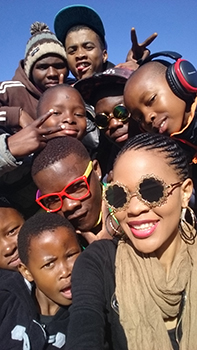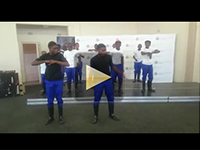
PhD candidate, Lerato Machetela and some members of the group Diamonds in the Rough having some fun between rehearsals.
|
Awash in hopelessness, substance abuse, violence, and sexual promiscuity. This is the lived reality of the youth in Jagersfontein. But now Lerato Machetela is using her research to change it.
As a PhD candidate in Trauma, Forgiveness, and Reconciliation Studies at the University of the Free State (UFS), Machetela assembled a group of 14 young men – ranging between the ages of 9 and 18 – who call themselves Jagersfontein’s Diamonds in the Rough. Combining elements from psychology, education, and entertainment, Machetela has established a platform that grounds these young ones adrift in circumstances. By means of song and dance, these young ones have become grounded through creativity.
While discussing what it means to be free in the new South Africa, Machetela asked the group to come up with a song similar to the struggle song, ‘Nelson Mandela usi litheli ixolo’.

Jagersfontein’s Diamonds in the Rough Researcher, Lerato Machetela, combines psychology, education, and entertainment to ground local youths through creativity.
|
The result: He’s a teenager, but he drinks Hansa.
“This then developed into a dance routine depicting what the youth is doing with their freedom,” Machetela says. With each beat of their boots and rhythmic clap of their hands, the group illustrates the ways in which the youth has constructed – and come to understand – their daily realities. “The routine includes the expression of alcohol and drug abuse, and ends of with the importance of education.”
Through the creative expressions of Diamonds in the Rough, Machetela is able not only to explore the reality of the youth in Jagersfontein, but also to investigate intergenerational trauma. “I am looking at whether there is a relationship between these young people’s current circumstances and the experiences of their parents’ generation during the apartheid years. That is, what sort of meanings do they construct as young, black South Africans growing up in the new South Africa?”
What started off as a research project is now rippling beyond academic spheres, though. The Free State Department of Sport, Arts, Culture and Recreation has taken note of this initiative. As a result, the group has already performed at the Bloem Show, International Museums Day, and Heritage Day celebrations, as well as at the Mangaung African Cultural Festival (MACUFE).